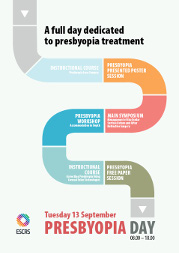Two-year outcomes of moderate hyperopia treatment with large ablation zone photorefractive keratectomy
Session Details
Session Title: Photoablation
Session Date/Time: Tuesday 13/09/2016 | 14:00-16:00
Paper Time: 15:15
Venue: Hall C2
First Author: : B.Kaluzny POLAND
Co Author(s): : I. Piotrowiak M. Kaszuba-Modrzejewska J. Stachura S. Mosquera S. Verma
Abstract Details
Purpose:
To evaluate refractive and visual outcomes of photorefractive keratectomy (PRK) in the treatment of moderate hyperopia with the use of aberration-neutral profile and large ablation zone.
Setting:
Oftalmika Eye Hospital, Bydgoszcz, Poland,
Collegium Medicum NCU, Bydgoszcz, Poland
Methods:
This retrospective, consecutive, observational case series comprised 57 eyes of 21 patients who underwent alcohol-assisted PRK to correct hyperopia within the range of 3.6 to 6.15 D (mean SE +4.59±0.66 D). All procedures were performed with Amaris 750S excimer laser (Schwind eye-tech-solutions GmbH, Kleinostheim, Germany) using aberration-neutral profile and the maximum diameter of total ablation zone feasible with the system (10 mm). Refractive results, predictability, safety, and efficacy were evaluated post-operatively at 2 to 3 years follow-up.
Results:
Mean postoperative MRSE was -0.01±0.41D, mean cylinder was 0.19±0.31D 1 year after the surgery (n=50); these metrics respectively changed to +0.08±0.44D, 0.16±0.27D 2 years post-operatively (n=49, paired t-test p=0.001), and +0.26±0.46D, 0.13±0.23D 3 years post-operatively (n=19, paired t-test p=0.1). Correlation between attempted versus achieved MRSE was very good (R2=0.7745, slope=0.887, intercept=0.39D). 80% of eyes were within ±0.50 D of attempted spherical correction. UDVA of 20/20 or better was seen in 20% of eyes preoperatively, and 85% of the eye 24 months post-operatively. One year after the procedure 22% of eyes lost one or two lines of CDVA and 28% gained a line or two.
Conclusions:
Photorefractive keratectomy with the use of aberration-neutral profile and large ablation zone provides good results in terms of efficacy, safety, predictability, and visual outcomes. Only minimal regression was observed in the first 3 years postoperatively.
Financial Disclosure:
... is employed by a for-profit company with an interest in the subject of the presentation, ... travel has been funded, fully or partially, by a company producing, developing or supplying the product or procedure presented





